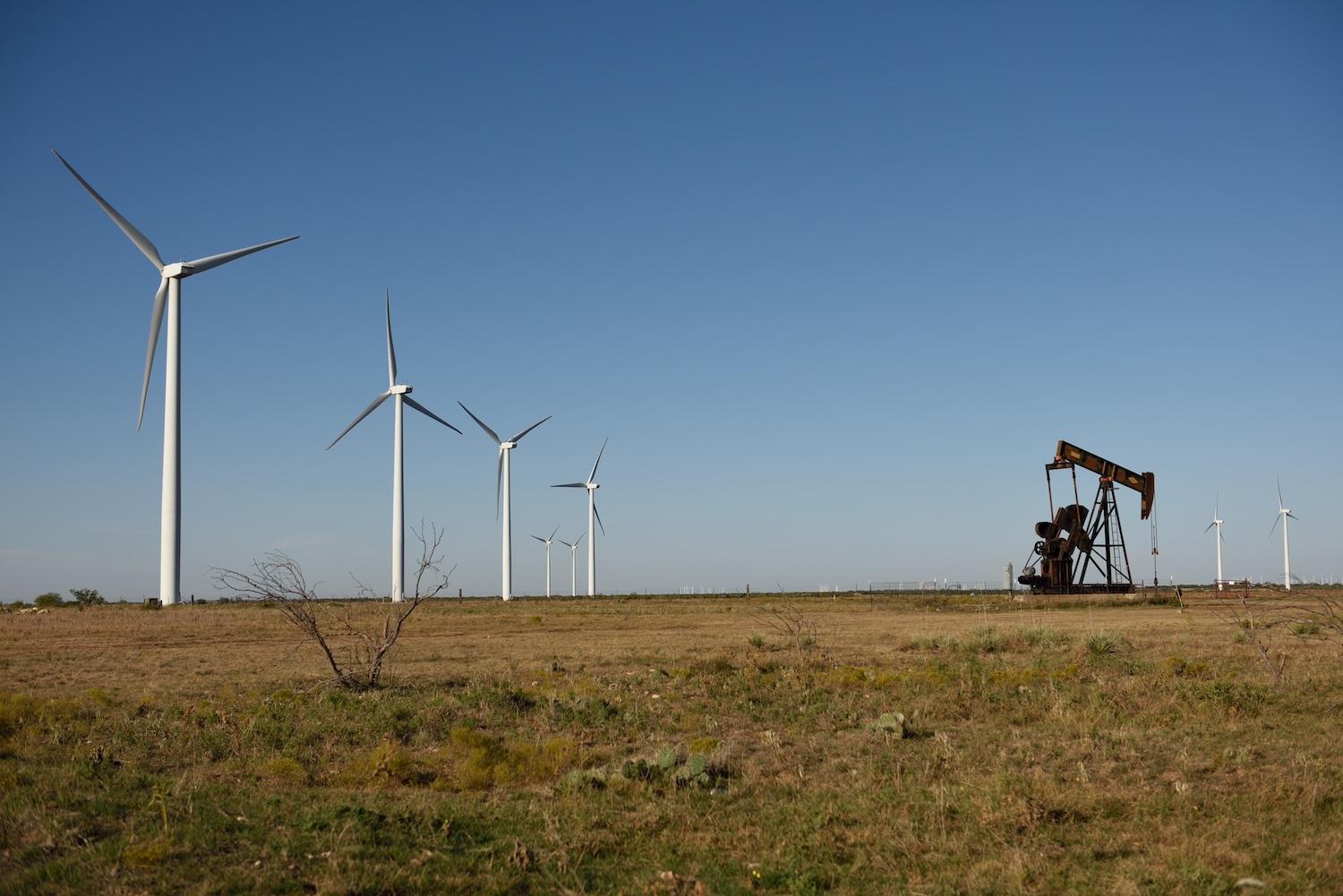Strange Bedfellows: Oil Companies Make the Case for Renewable Energy in Texas
May 14, 2025

Wind turbines and a crude oil pump sit side-by-side in West Texas. (Image: RobertCoy/Adobe Stock)
Texas has drawn flocks of renewable energy investors since the early 2000s, attracted by the state’s relaxed regulatory environment, self-contained power grid, and surging electricity demand. Back then, state legislators in both parties supported the economic case for wind and solar farms. That political consensus ruptured over recent years, but new alliances could help Texas remain a renewable energy leader in the U.S.
One renewable energy consensus crumbles. . .
The Texas grid does not participate in electricity-sharing programs like other states. The grid manager, ERCOT, relies almost entirely on in-state power generation resources to cover growth in demand and respond to grid emergencies including brownouts and blackouts.
Texas lawmakers on both sides of the aisle had the state’s copious wind and solar resources in mind when they approved a Renewable Portfolio Standard in 1999 and expanded it in 2005, with the goal of encouraging investment in renewable energy projects. In 2005, state lawmakers also approved the construction of a new transmission line to connect wind turbines in the wind-rich western part of the state with population and industrial centers in the east. The transmission line went into operation in 2013, setting the stage for Texas as the top U.S. state for wind production. Texas also vies with California for the top spot in solar energy, and the state is attracting energy storage stakeholders as well.
Meanwhile, though, a schism developed. Renewable energy became a hot-button political issue closely identified with former Democratic President Barack Obama under his administration. In 2013, Republican State Senator Troy Fraser introduced legislation aimed at eliminating the state’s Renewable Portfolio Standard and demoting the Renewable Energy Credit program to voluntary status. The measure passed two years later.
. . . while another emerges
The partisan split widened into a chasm in the years following the election of Donald Trump to his first term in office, fueled by his party’s ad hominem attacks on corporate ESG (environmental, social and governance) principles and their “anti-woke” rhetoric.
Having previously taken steps to thwart renewable energy investing by firms doing business in Texas, the legislature is now considering additional bills aimed at obstructing renewable energy projects. That includes Senate Bill 715. Approved by the Senate last week, SB 715 imposes burdensome new financial requirements on wind and solar developers, impacting both new projects and those already operational. A companion bill, House Bill 3356, is scheduled for a vote this week.
The legislation sparked furious objections from leading wind and solar organizations. Fossil energy stakeholders have reportedly objected to SB 715 as well. San Antonio News-Express staff writer Sara DiNatale took note of remarks made by the sponsor of SB 715, Republican Kevin Sparks, on the floor of the Senate. “He admitted to senators Thursday that both the Texas Oil & Gas Association and the Texas Association of Manufacturers oppose the legislation,” DiNatale wrote.
Diversified energy stakeholders oppose restricting renewables in Texas
As of this writing, neither organization has posted a public statement of opposition on their respective websites. Their also names do not appear in a list of witnesses for and against SB 715 posted by the Texas Senate Business and Commerce Committee on April 1, so it’s possible they made their position known off the official record.
Other fossil fuel stakeholders have gone on record opposing the bill, including the advocacy organization Advanced Power Alliance. The Alliance’s primary mission is to support the renewable energy transition, but its members include global oil and gas firms that are moving toward renewables while continuing to maintain a footprint in the oil and gas industry.
BP, for example, joined the Alliance in 2000 and is still a member through its Lightsourcebp solar energy venture. The global energy firms EDF and EDP also hold membership in the Alliance through their renewable energy branches, while other global firms like Enel and Engie are members directly. The Alliance also represents U.S. utilities with diversified power generation portfolios, including Duke Energy, NextEra Energy and Southern Power. Diversified energy investors including Brookfield, Copenhagen Infrastructure Partners, and OakTree are members, too. As are U.S. infrastructure businesses such as the leading construction firm McCarthy.
Representing this diverse group of stakeholders, the Alliance has taken a strong position against SB 715. “Its retroactive mandates likely violate the Texas Constitution’s contract protections, inviting costly litigation and undermining investor confidence in Texas’ historically business-friendly climate,” a public statement from the organization reads. “SB 715 sends a troubling signal to investors: Texas is willing to change the rules midstream. This level of regulatory uncertainty discourages investment across energy and other capital-intensive industries — and likely explains the broad opposition from stakeholders.”
The Alliance also publicly opposes SB 388, which would make it more difficult to add utility-scale energy storage systems to the grid. “SB 388 imposes a mandate based on outdated thinking from over 25 years ago. Today’s grid requires dynamic solutions — not arbitrary market intervention,” the organization wrote in March. “SB 388 moves us away from ERCOT’s competitive, energy-only market — something policymakers have repeatedly rejected.”
The Texas Association of Business commissioned a study to assess how legislation proposed in the current session could impact energy prices in the Lone Star State. The result? “Restricting renewable energy expansion would drive a 14 percent increase in power prices by 2035, translating to a 10 percent increase in power bills, and could leave up to 620,000 homes without electricity during extreme weather events,” the analysis found.
Texas may be at risk of throttling back its prospects for economic growth, or it may continue to encourage domestic and global investors to keep the state’s economy thriving. The new consensus between diverse energy stakeholders is a hopeful sign, but it all depends on whether or not Republican members of the state legislature release the hobbles of partisan politics and recognize the crucial role of wind and solar energy in the state’s power generation profile.
Search
RECENT PRESS RELEASES
Related Post




